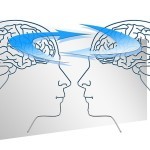28 Apr Our Brains are Starving
 The rate of depression increased every year of the last decade after showing a dramatic spike upward in the 1990s. According to the 2011 report from the Centers for Disease Control and Prevention, eleven percent of Americans are taking antidepressant medication, which includes the fact that more than one in five women ages 40-59 are on antidepressants, the highest of any age group.
The rate of depression increased every year of the last decade after showing a dramatic spike upward in the 1990s. According to the 2011 report from the Centers for Disease Control and Prevention, eleven percent of Americans are taking antidepressant medication, which includes the fact that more than one in five women ages 40-59 are on antidepressants, the highest of any age group.
Why all this unhappiness?
Certainly our brains are overfed with stimuli: visual images, facts and information, celebrity gossip, and the news. Never have people desired as much from life or expected to get it: perfect bodies, perfect health, perfect relationships, wealth and fame. We are constantly being sold superficial values which cannot bring fulfillment, leading to extremes of loneliness and despair.
In addition to the stress of unrealistic expectations, our brains are malnourished from our lousy diets. We’ve all heard about how badly we eat, our food loaded up on fat, sugar, and chemicals. The depleted soil leaves our food devoid of nutrition. Caffeine, alcohol, and sugar cause blood sugar drops that lead to mood swings, anxiety, and depression. We worry about the effects on our bodies but forget to consider what it does to our brains.
Our diet of processed foods is starving our brains of the neurotransmitters we need to be happy. People “develop emotional symptoms as a direct result of the unavailability of the brain and body chemicals needed for stable feelings, thoughts, and memory,” states Joan Matthews Larson, PhD in Seven Weeks to Sobriety.
National Institute of Mental Health (NIMH) findings show that the neurotransmitter serotonin is nearly depleted in the brains of suicides examined during autopsies.
A whole class of antidepressants has been developed to regulate serotonin. These drugs are effective for many people and have brought much relief.
But stress and poor nutrition can nullify these effects. If you do not take in enough protein, vitamins, or minerals to build the neurotransmitters, an imbalance develops. In addition to improving one’s diet, natural supplements have been found helpful. In my opinion, all people suffering from depression should be taking Fish Oil for Omega-3 fatty acids daily. There is also compelling research on the use of amino acids, Sam-E, St. John’s Wort, DHEA, and B vitamins.
The truth is, many unhappy people will not find relief from their symptoms until they control their diets with the stringency of the diabetic, learning to eat fresher and healthier foods and taking supplements. If you’re one of the many struggling with problematic moods, it’s certainly worth a try.
© 2014 Catherine Auman This article is an excerpt from Catherine’s book Shortcuts to Mindfulness: 100 Ways to Personal and Spiritual Growth


Sorry, the comment form is closed at this time.